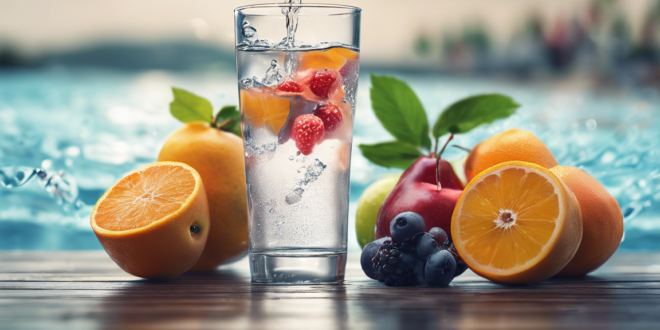Hydration: The Key to Optimal Health
Water is the essence of life, yet many Americans underestimate its critical role in maintaining overall health and well-being. In a world of countless beverage options, understanding the profound impact of proper hydration can be a game-changer for your physical and mental performance. This comprehensive guide will explore the science behind hydration, its incredible benefits, and practical strategies to ensure you’re meeting your body’s water needs.
The Science of Hydration: Why Water Matters
The human body is approximately 60% water, with critical systems depending on proper hydration to function optimally. Every cell, tissue, and organ relies on water to perform essential functions. From regulating body temperature to transporting nutrients and removing waste, water is the fundamental building block of life.
Devastating Effects of Dehydration
Dehydration is more than just feeling thirsty. It can lead to a cascade of negative health consequences:
• Cognitive impairment and decreased mental performance
• Reduced physical endurance
• Increased risk of heat-related illnesses
• Potential kidney problems
• Compromised immune system function
• Digestive issues and constipation
• Skin health deterioration
• Heightened risk of headaches and migraines
Signs of Dehydration to Watch For
Recognizing dehydration early is crucial. Common symptoms include:
• Dark-colored urine
• Persistent fatigue
• Dry mouth and lips
• Decreased urination
• Dizziness
• Rapid heartbeat
• Confusion or irritability
• Muscle cramps
Optimal Hydration Benefits
Proper hydration offers remarkable advantages that extend far beyond basic survival:
1. Enhanced Physical Performance
Regular water intake improves muscle function, reduces fatigue, and increases overall endurance. Athletes and fitness enthusiasts can significantly improve their performance by maintaining optimal hydration levels.
2. Weight Management
Water plays a crucial role in metabolism and can help suppress appetite. Drinking water before meals can reduce calorie intake and support weight loss efforts. Studies suggest that individuals who maintain proper hydration tend to have more successful weight management outcomes.
3. Cognitive Function
Brain performance is directly linked to hydration. Even mild dehydration can impair concentration, memory, and mood. Consistent water intake helps maintain mental clarity and reduces the risk of cognitive decline.
4. Skin Health
Hydration is the secret to glowing, youthful skin. Water helps maintain skin elasticity, flush out toxins, and prevent premature aging. Regular water consumption can reduce the appearance of wrinkles and promote a natural, healthy complexion.
Personalized Hydration Strategies
Determining your ideal water intake isn’t a one-size-fits-all approach. Factors like age, weight, activity level, climate, and overall health influence individual hydration needs. The traditional recommendation of eight 8-ounce glasses per day is a good starting point, but many experts now suggest a more personalized approach.
Calculating Your Water Needs
A general guideline is to drink between 0.5 to 1 ounce of water per pound of body weight daily. For example:
• 150-pound individual: 75-150 ounces of water
• 200-pound individual: 100-200 ounces of water
Adjust these amounts based on physical activity, climate, and individual health conditions.
Practical Hydration Tips
1. Start Your Day with Water
• Drink a glass of water immediately upon waking
• Use a marked water bottle to track intake
• Set hourly hydration reminders
2. Enhance Water Consumption
• Infuse water with fruits for added flavor
• Eat water-rich foods like cucumber and watermelon
• Use smartphone apps to track hydration
• Keep water easily accessible throughout the day
When Water Isn’t Enough
In extreme conditions or during intense physical activity, plain water might not suffice. Electrolyte-enhanced drinks can help replace minerals lost through sweat. However, be cautious of sugary sports drinks and opt for balanced, low-sugar alternatives.
Special Hydration Considerations
Certain populations require extra attention to hydration:
• Pregnant and breastfeeding women
• Elderly individuals
• People with chronic medical conditions
• Athletes and outdoor workers
• Individuals taking certain medications
Conclusion: Make Hydration a Lifestyle
Hydration is not a temporary fix but a lifelong commitment to health. By understanding your body’s water needs and implementing strategic hydration practices, you can unlock unprecedented levels of physical and mental performance.
Remember, every sip counts. Your journey to optimal health begins with something as simple yet powerful as water.
 Good Calories Guide GoodCalories Guide focuses on nutrition, healthy eating, and overall wellness. The site offers practical insights into evidence-based dietary practices, including tips for specific lifestyles such as veganism, keto, and family-friendly meal planning. It also addresses unique nutritional needs for individuals with conditions like diabetes or food allergies, while providing quick and accessible recipes to make healthy living a sustainable and enjoyable choice.
Good Calories Guide GoodCalories Guide focuses on nutrition, healthy eating, and overall wellness. The site offers practical insights into evidence-based dietary practices, including tips for specific lifestyles such as veganism, keto, and family-friendly meal planning. It also addresses unique nutritional needs for individuals with conditions like diabetes or food allergies, while providing quick and accessible recipes to make healthy living a sustainable and enjoyable choice.


